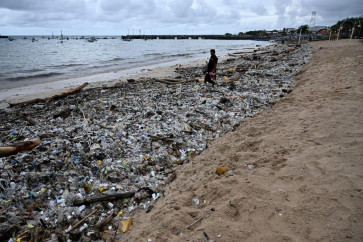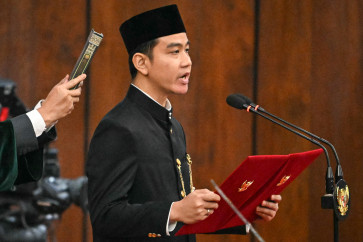ASEAN increases people’s capacity to mitigate disasters
As a region that is prone to natural disasters, Southeast Asia will enhance its people’s capacity to quickly respond to disasters, an ASEAN official has said
Change text size
Gift Premium Articles
to Anyone

A
s a region that is prone to natural disasters, Southeast Asia will enhance its people’s capacity to quickly respond to disasters, an ASEAN official has said. Such a measure is seen as crucial to managing the region’s future.
It is estimated that the region loses US$4.4 billion from the impact of natural disasters every year. The region is a disaster hotspot, and the multi-billion dollar losses are during the good years, ASEAN Coordinating Center For Humanitarian Assistance (AHA Center) executive director Said Faisal said.
With the ever-present potential for massive disasters like the Indian Ocean Tsunami that killed more than 200,000 people in 2004 as well as the 2013 Typhoon Haiyan that killed 6,300 in the Philippines, the region must prepare itself for hardship. More than 50 percent of mortalities from global disasters occurred in the region between 2004 to 2014.
Given the region’s susceptibility to disasters, the center has emphasized the need to invest in building human capability in order to address future challenges in a swift and timely manner.
The center kicked off training on Friday for the third batch of the AHA Center Executive (ACE) Program. This year’s program will see sixteen officers from eight ASEAN member states’ national disaster management offices (NDMOs) participate in training. In Indonesia, the disaster body is the National Disaster Mitigation Agency (BNPB).
“It is about preparing our future leaders. It is about investment in human capital,” Said said.
“We understand that disasters have become a day-to-day reality. This is what compels us to prepare for the future. This requires solidarity across ASEAN,” he added.
The ACE Program is an annual regional disaster management training and capacity building activity that includes more than 1,000 hours of training. With this third batch, there are now 45 ACE participants who have trained in the program since the ACE Program was first launched in 2014.
Each member state sends a pair of officers who have undergone a selection process. Singapore and Brunei Darussalam — the two least-populous countries in the region — will not participate due to a lack of human resources.
During the training, the participants will also travel to disaster-affected areas in Indonesia, New Zealand and Japan for comparative studies.
“Disaster Management is one of the priority areas of ASEAN-Japan cooperation. Japan has supported the AHA Center since its establishment in 2011 through various projects including the ACE Program,” Kazuo Sunaga, the Japanese ambassador to ASEAN, said in his remarks.
“We are pleased to provide the ACE Program officers with an opportunity to train in Japan, and hope it will contribute to sharing lessons learned from the Great East Japanese Earthquake, as well build and consolidate the network for disaster management between ASEAN and Japan.”
The ACE Program is managed by the AHA Center with the support of the government of Japan through the Japan-ASEAN Integration Fund (JAIF).
In addition to support provided by Japan through JAIF, the ACE Programme is also supported by various organizations, including NDMOs, the ASEAN Secretariat, the UN Office for the Coordination of Humanitarian Affairs, the UN World Food Programme, the UN Humanitarian Response Depot, the International Organization for Migration and the International Federation of Red Cross and Red Crescent Societies. The government of Australia, the US and New Zealand also sponsor the program.
“Through this program, ASEAN is enhancing the capacity of NDMOs in the region by equipping them with the necessary skills and competencies that will enable them to embrace future challenges,” AKP Mochtan, ASEAN’s deputy secretary-general for community and corporate affairs, said.









